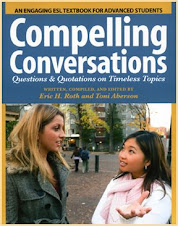Sometimes you just have to smile and feel good about your achievements!
Praise, especially from an experienced colleague living thousands of miles away, on a difficult project feels satisfying. In the last week, I’ve received three emails from Joan V., an ESL teacher and tutor, praising Compelling Conversations: Questions and Quotations on Timeless Topics – the book that I co-authored and self-published. Naturally, a smile crosses my face.
Imagine my surprise when a complete stranger emails me that "Teachers and tutors should know about Compelling Conversations... It's a marvelous book!"
Her experiences mirror my own experiences with the material, and validate the book’s premise: engaging students in sophisticated conversation helps build their vocabulary, leads to memorable conversations, and deepens relationships.
Here, in her own words, are excerpts from Joan’s strong recommendation.
-------------------------------------------------------------------------------------------------------
I am an English tutor working with Japanese adults in Jackson, Michigan. I was a public school and ESL teacher for many years, retired, and now my retirement job is tutoring. A few weeks ago I purchased the PDF of your book and then this week I bought the hard copy which just arrived from you this morning. I want to tell you what a marvelous book this is!
I’ve always used questions as a conversation stimulus, and now I have this whole organized around topics book to use with my students! As you probably know, Many Japanese arrive in this country with a fair understanding of English grammar and quite a lot of vocabulary, but are initially unable to engage in conversation. This book is the perfect answer to this situation!
Thank you so much for putting this together!
Teachers and tutors should know about Compelling Conversations... I was a classroom ESL teacher for many years, went to conferences with book displays shopping for books, and was usually disappointed by the books I saw. There were a lot of boring books out there!
The book needs to on display at ESL conferences if they are still being held. ESL teachers and tutors working with intermediate and advanced level students would choose this book over almost anything else if they knew about it. Also many community colleges have ESL programs using traditional materials focused on grammar and repetition rather than real meaningful conversation which your book provides.
I happened on your book accidentally on the internet and looking at the sample lessons, I quickly knew that this book would work for my students.
I wanted to add one more thought regarding Compelling Conversations. It is saving me a lot of time! I have been tutoring Japanese adults (businessmen and their wives) for nine years after retiring from almost 30 years of teaching in public schools. I've spent so much time gathering materials from various sources--textbooks, my own materials, bilingual dictionaries, etc.
Now I'm finding that printing out a chapter of your book provides plenty of conversational focus for at least two hours or more of tutoring time. Even more important, our conversations are at a deeper level. For example, in chapter two there are some questions about childhood. A couple of weeks ago a student ordering on fluency was able to tell me about his childhood dreams and that now he is living that dream! I was thrilled!
Thanks.
Joan
----------------------------------------------------------------------------------
Wow!
Thank you, Joan! You made my week!
Check out sample Compelling Conversations lessons for yourself at:
http://www.compellingconversations.com/pdf/cc_sampler_esl.pdf
http://www.compellingconversations.com
Hopefully, you will have the same satisfying experiences that Joan and other satisfied teachers and tutors have had with Compelling Conversations. Enjoy!
Ask more. Know more. Share more.
Create Compelling Conversations.
Visit www.compellingconversations.com





